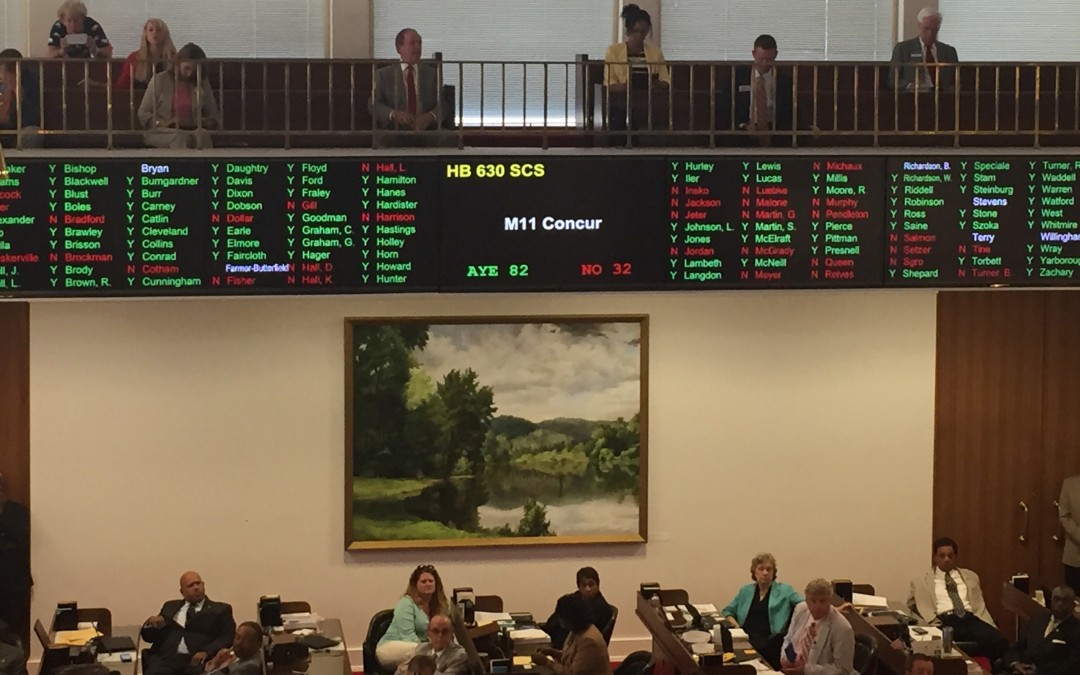MT Raleigh Report | April 4, 2017 – Stream Dangers
MT Raleigh Report | April 4, 2017 – Stream Dangers
In this installment of MTRaleigh – Rumors, deal-making and legislating surrounding the repeal of HB2 sucked up much of the air at the General Assembly this past week. In this edition of MTRaleigh, we’ll look at the danger to streams posed by legislation moving through the legislature and give a quick overview of HB2 drama.
Stream Dangers
This year’s version of the Regulatory Reform bill is moving through the General Assembly at a pretty good clip. It has already passed the Senate and has been voted out of committee on the House side. We expect to see it on the House floor early in the week.
As you probably remember, these “reform” bills often mean rolling back or weakening environmental protections. This year is no different. Of particular concern are the sections on stream mitigation. The bill includes a provision that requires the state to formally request a change from the Army Corps of Engineers to double the length of stream damage (from 150 feet to 300 feet) before developers are required to pay into a fund that supports stream repair in other parts of the state to offset the damage their projects have. The bill would also completely eliminate mitigation requirements for intermittent streams. In addition to funding stream restoration, these rules also act as an important incentive for developers to limit the impact of their projects.
While some legislators called the current regulations overly burdensome, Upper Neuse Riverkeeper Matthew Starr said that the flooding the state experienced during Hurricane Matthew demonstrates why the changes are bad policy.
“Just months after the worst recorded flood on the Neuse from Matthew the first bill that we’re doing with streams will ensure that we have exponentially higher risk from flooding,” Starr said during committee hearings.
HB2 Repeal, Reset, Redux?
Late Wednesday night GOP legislative leaders and Gov. Roy Cooper announced an agreement to repeal House Bill 2. On Thursday, both the GOP Senate and the GOP House approved the new legislation, with liberal Democrats and conservative Republicans voting against the compromise bill. Governor Cooper signed the legislation Thursday afternoon.
To date, the HB2 debate has taken up an enormous amount of time and energy, delaying the legislature’s consideration of a number of other important but less high-profile issues. With the HB2 issue now settled, look for the General Assembly to go into overdrive on a wide range of other bills and issues – the budget, tax reform and energy policy among them.
The legislation approved last week:
- Repeals House Bill 2 in its entirety
- Reserves the authority to regulate bathrooms to the state, essentially returning to the status quo before Charlotte passed a 2016 ordinance allowing transgender people to use the restroom of their gender identity.
- Enacts a moratorium on similar local ordinances until Dec. 1, 2020.
Gov. Cooper and business leaders – including the NC Chamber of Commerce – supported the new legislation, which reportedly will meet the requirements of the ACC, NCAA and the NBA to consider locating sporting events in North Carolina.
LGBT civil rights organizations, including Equality North Carolina, opposed the bill, arguing that it continues discrimination against transgender people. HB2 supporters also opposed the new bill, arguing that it abandons the privacy protections for women and children in the original legislation.
Hendersonville Rep. Chuck McGrady was deeply involved in the extensive negotiations on the HB2 compromise. You can find an interview with him on the issue here.
In other news of interest to WNC environmentalists –
State hosts public meeting in Asheville on Duke Energy’s coal ash plans
What to Know About Trump’s Order to Dismantle the Clean Power Plan
Despite renewable energy’s impressive gains, NC lawmakers move to limit it




